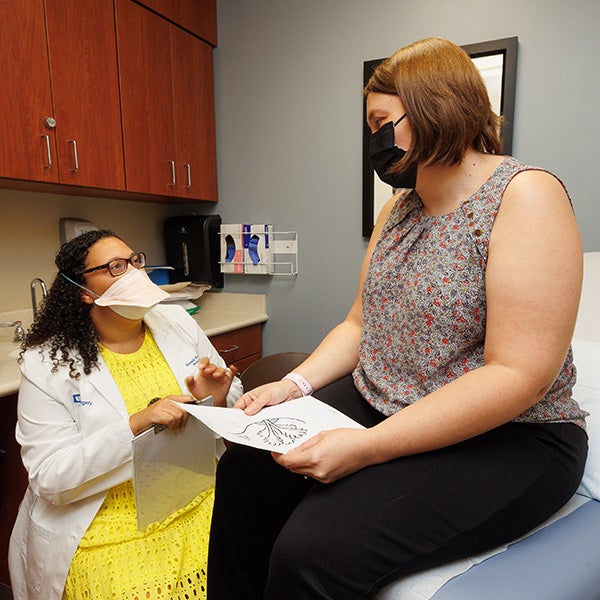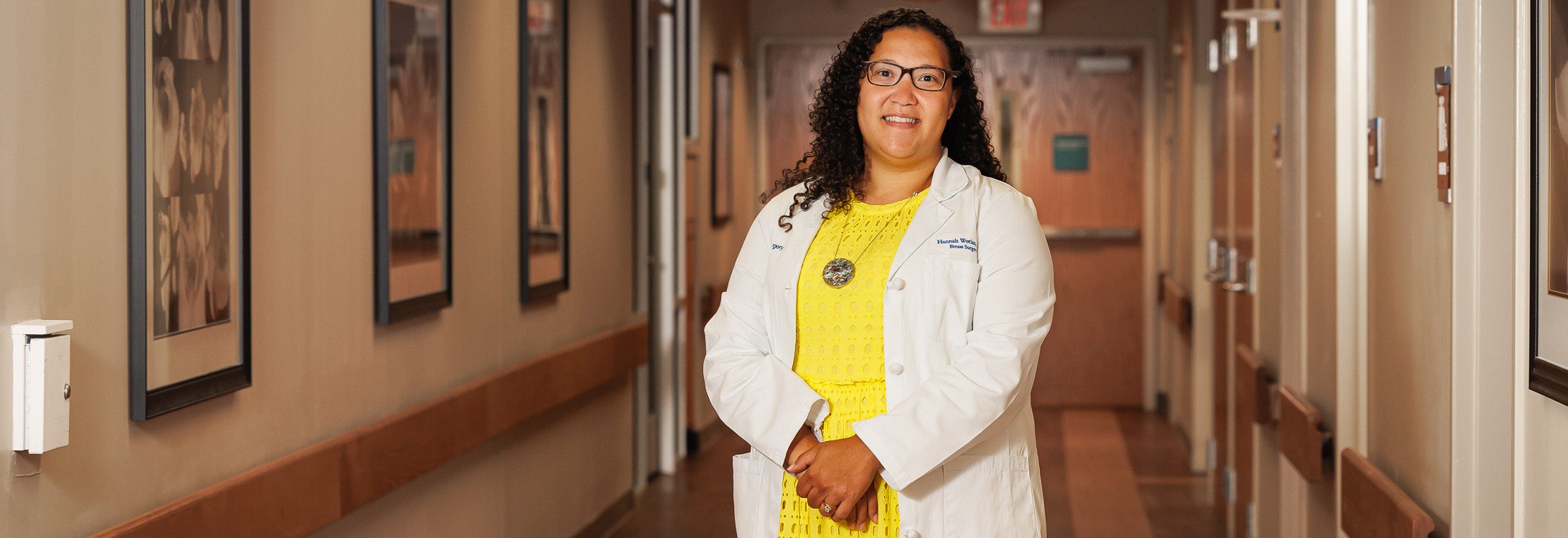PIONEERING SURGEON
Brody School of Medicine alumna becomes Lumbee tribe’s first female surgeon
For as long as she can remember, Hannah Woriax wanted to be a doctor and a scientist.
Some of the Pembroke native’s earliest memories were scooting around her grandfather’s Robeson County family medicine practice in her walker and giving her dolls checkups.
As a result, she always assumed that she would follow her grandfather — Dr. Frank Woriax, the first Native American to graduate from Duke University’s School of Medicine — into practicing family medicine.
That is why she chose to attend the Brody School of Medicine at East Carolina University over other medical schools.
“I really found East Carolina to be more attractive and their values to be more in line with how I wanted to care for patients long term. And when they told me that it was going to be a very patient-centered experience, that we were going to learn how to listen to people and use the information they gave us to come up with a diagnosis and form a treatment plan together, to me, that was the way everything should be done,” Woriax said. “And with Brody being an entity that is training people for the purpose of coming back to this area to serve, I had no desire to go anywhere else. So, all signs pointed to East Carolina for me very early on.”
During her time at Brody, however, Woriax began feeling drawn to surgery instead of primary care.
A series of faculty mentors provided her the encouragement she needed to chart her own path in that specialty, even though she had no other examples of Native American female surgeons to reference.
These mentors told her that it did not matter if she was the first, she just needed to be “a good first” and serve as the example that she did not have herself.
“They showed me that you don’t have to look like somebody to be their mentor,” Woriax said. “You just have to know when to say the right thing.”
That encouragement led Woriax to pursue a surgical residency at Virginia Tech Carilion School of Medicine upon graduating from Brody in 2014 and then a breast surgical oncology fellowship at the University of Alabama Birmingham.

Woriax, a breast surgical oncologist, talks with a patient in rural Laurinbug, North Carolina.
In August 2021, she returned home to practice in Robeson County as a breast surgical oncologist for Duke Health and as the Lumbee tribe’s first female surgeon.
“It is interesting for me to go back to career days now and have children say to me that they want to be a surgeon and for me to say, ‘There is absolutely a way for you to do it. If I can do it, there is no question in my mind that you can do it.’ Being able to say that to them in a meaningful way is immeasurable,” she said. “When I chose surgery, I didn’t have anyone to look at locally and see what it was going to look like for me. I’m thankful that from now on, no one is going to have to say that.”
However, Woriax understands better than most the serious health and socioeconomic challenges faced by patients in Robeson County — one of the state’s poorest counties. And she has unfortunately already treated former high school classmates and long-time family friends.
“The people I see every day are my neighbors. There is often nothing different from me and these patients other than a few years and maybe a few blocks,” she said. “So, I have the responsibility of being the voice for that patient — in way that recognizes every struggle that they’re bringing to the table — and that is very humbling.”
But she learned very early on in her residency training that the Brody School of Medicine better prepared her than most of her peers for that challenge.
“There was a distinct difference in the early parts of my training in terms of how many of us had seen large numbers of patients and had large amounts of testing experience with patients. And it was obvious to our attending that a lot of that was taught at Brody,” she said. “So, whenever we had to have a thoughtful conversation with a patient, and delicate gloves were needed, they would always send me instead of my counterparts because of the training I received at Brody.”
Woriax also credited the Brody School of Medicine for helping to change her life.
“Brody is the reason I’m able to practice any type of medicine today, and also the reason why I am able to do what I love, where I love,” she said. “I can’t say that I would’ve gone to any other medical school and done surgery. I can’t say that I would’ve gone to any other medical school and come back home. The Brody experience made my experience.”
